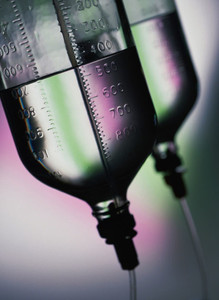Hospira, self-proclaimed leader in injectable generics, announced on 9 January 2012 that the company had enrolled the first patient in its phase III programme in the US for its biosimilar erythropoietin (EPO).
Hospira starts phase III programme for biosimilar erythropoietin
Biosimilars/News
|
Posted 13/01/2012
 0
Post your comment
0
Post your comment

The news follows the successful completion of Hospira’s phase I trial, which met its key endpoint in September 2011. The trial showed equal pharmacokinetics, or concentration levels in the blood and distribution in the body, for Hospira’s EPO and the reference product, Amgen’s Epogen [1].
EPO is a treatment for anaemia associated with chronic renal failure. Hospira’s phase III programme will compare the safety and efficacy of Hospira’s EPO with Amgen’s Epogen in patients with anaemia associated with chronic renal (kidney) failure and chemotherapy.
The programme will enrol approximately 1,000 patients on haemodialysis who have already been treated with Epogen at more than 200 haemodialysis centres across the US.
The phase III programme is being conducted in collaboration with DaVita and Fresenius Medical Care, as well as at many dialysis clinics and hospitals across the US.
Dr Sumant Ramachandra, Senior Vice President, Research & Development and Medical & Regulatory Affairs, and Chief Scientific Officer at Hospira, commented that this was ‘another important step as Hospira prepares to introduce safe, effective and affordable biosimilars in the United States’. He added that Hospira is committed ‘to offering US patients access to these important medications’.
Results from the phase III programme are expected in 2013.
Epogen is Amgen’s original blockbuster drug and the engine of much of the company’s sales. According to Wikinvest, Epogen had sales of US$2.5 billion in 2010.
The patent on Epogen expired in Europe in 2004, with the US patent expected to expire in 2014 [2].
Hospira already sells a biosimilar EPO in Europe, Retacrit, making it the first US-based company with biosimilars on the European market. Retacrit, introduced in 2008, now has a more than 50% share of the total short-acting EPO biosimilar market in Europe. Hospira also launched Nivestim, a biosimilar version of filgrastim, in Germany, Ireland and the UK, in 2010. Filgrastim is a granulocyte colony-stimulating factor (G-CSF) used to treat neutropenia, a condition in which the body makes too few infection-fighting white blood cells. The condition is often caused by drugs prescribed for cancer treatment.
Hospira therefore has much to gain by being ready with a biosimilar EPO by 2014 when, hopefully, the US biosimilars pathway should be in place.
Related articles
Biosimilars approved in Europe
Generic combination antibiotic launched in US
Australia approves first biosimilar filgrastim
Phase I trial of a biosimilar erythropoietin
References
1. GaBI Online - Generics and Biosimilars Initiative. Positive results for Phase I trial of biosimilar erythropoietin [www.gabionline.net]. Mol, Belgium: Pro Pharma Communications International; [cited 2012 January 13]. Available from: www.gabionline.net/Biosimilars/News/Positive-results-for-phase-I-trial-of-biosimilar-erythropoietin
2. GaBI Online - Generics and Biosimilars Initiative. Market opportunities for biosimilars [www.gabionline.net]. Mol, Belgium: Pro Pharma Communications International; [cited 2012 January 13]. Available from: www.gabionline.net/Biosimilars/General/Market-opportunities-for-biosimilars
Source: Hospira
Research
Reaching ESG goals in pharmaceutical development
What is the future for the US biosimilar interchangeability designation
General
Samsung Bioepis wins Pyzchiva case; Regeneron patent rulings threaten foreign biosimilars
Chinese biosimilars go global: growth, partnerships, and challenges
Most viewed articles
The best selling biotechnology drugs of 2008: the next biosimilars targets
Global biosimilars guideline development – EGA’s perspective
Related content
FDA approves Poherdy (first interchangeable pertuzumab) and Armlupeg (pegfilgrastim) biosimilars
EMA recommends approval for insulin glargine biosimilar Ondibta and denosumab biosimilar Osqay
FDA approves denosumab biosimilars Osvyrti and Jubereq, Boncresa and Oziltus
FDA approves aflibercept biosimilar Eydenzelt and label expansion for adalimumab biosimilar Yuflyma
FDA approves Poherdy (first interchangeable pertuzumab) and Armlupeg (pegfilgrastim) biosimilars

Biosimilars/News Posted 27/01/2026
EMA recommends approval for insulin glargine biosimilar Ondibta and denosumab biosimilar Osqay

Biosimilars/News Posted 16/01/2026
FDA approves denosumab biosimilars Osvyrti and Jubereq, Boncresa and Oziltus

Biosimilars/News Posted 07/01/2026
FDA approves aflibercept biosimilar Eydenzelt and label expansion for adalimumab biosimilar Yuflyma

Biosimilars/News Posted 05/12/2025
The best selling biotechnology drugs of 2008: the next biosimilars targets






Post your comment